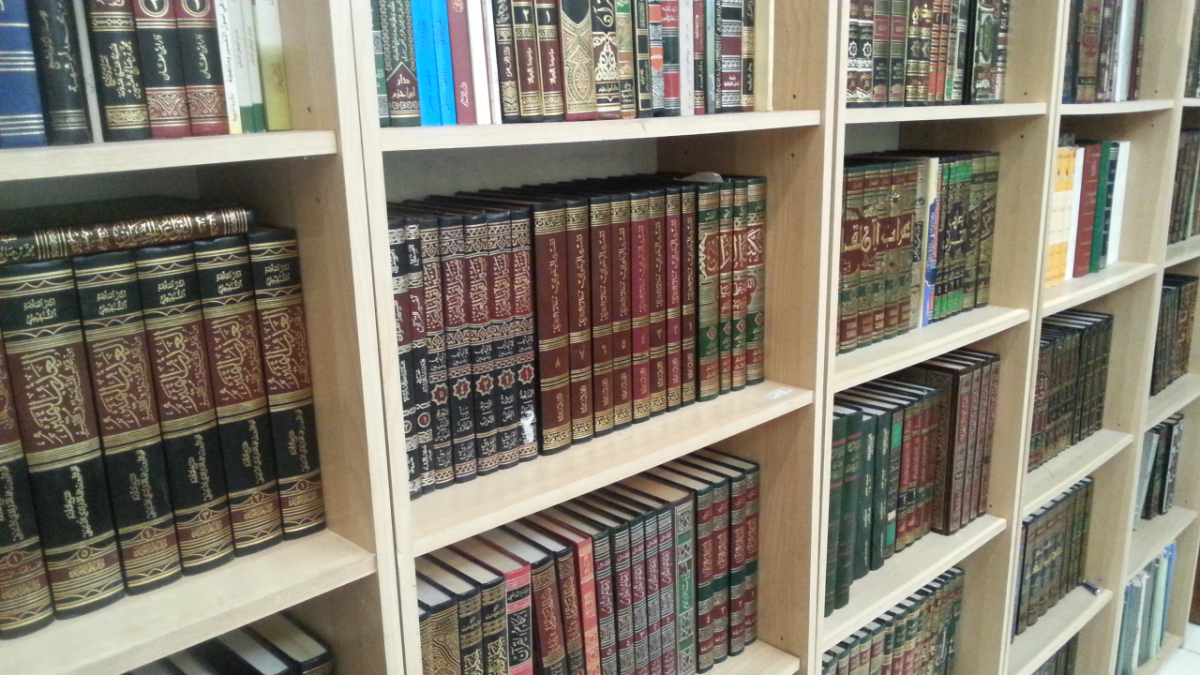The Sciences of Qur’an (Ulûm Al-Qur’an)
About the Course
The course is a gateway to understanding the unparalleled nobility of the Quran with a detailed exploration of the Quranic Sciences (Ulûm Al-Quran) and the Science of Exegesis (Tafsir), with utmost focus on the revelation of the Quran, its compilation, style, translation and other varied Qur’anic concepts.
Course Team

Mufti Muhammad Ibn Adam
(Darul Iftaa, Leicester, UK)

Shaykh Kamil Uddin
(Lecturer, Darul Qasim, Chicago, USA)

Ustadh Safaruk Chowdhury
(Humanities Team and IB Theory of Knowledge Coordinator, Tutor in History and Religious Studies)

Shaykh Haroon Sidat
(Research Associate, Cardiff University)
AT A GLANCE
12 Live Online Sessions
Duration: 4 Months
Sundays | 12:00PM - 1:00PM BST
Video Recordings Available

Mobile App
Live Q&A
Certificate
Enrol Now
Starts on November 8, 2020.
Course Fee
Pay in Full: £79.99 £39.99
Pay in 4 Installments:£9.99
Registration Deadline
November 10, 2020.
Al Balagh Scholarship
AlBalagh Scholarship is available for learners who cannot afford the fee.
Main Modules

1. The Qur’an and Revelation
- Defining Quran
- Divine Revelation
- Kinds of Revelation
- Methods of Revelation
- The Qur’an, The Hadith and Hadith Qudsi
- Intellectual Doubts about Revelation

2. Tadweenul Quran : Compilation of the Quran
- Two Orders of the Quran
- The Order of Revelation (Chronology)
- The Arrangement of the Book .
- Transmission of the Qur’anic Word and Written Text
- Memorisation and Oral Transmission
- The Mushaf of Uthman
- Quranic Scriptures
- Development of the Qur’anic Script
- The Kufic Script
- The Hijazi Script
- The Qur’an in Manuscript and Print

3. The Preservation of the Quran : A Miracle
- The Miraculous Nature of the Preservation of the Quran
- A Comparison with the Bible and the Torah
- Doubts about the Preservation of the Quran
- How to Answer?
- Virtues of Memorising the Noble Quran

4. The Modes (ahruf) of the Qur’an and Recitations (qir’at)
- The Seven Modes of the Qur’an
- Most Acceptable Explanation of Seven Modes
- The Different Recitations (Qirat)
- The Significance of the Role of Reciters (Qurra’)

5. Form, Language and Style
- The Language of the Quraish
- Narrative in the Qur’an
- Similes in the Qur’an
- Oaths in the Qur’an
- Muhkamat and Mutashabihat (Clear and ambiguous verses)
- The Mystic Letters of the Qur’an (al-Muqatta’at)

6. Asbab al-Nuzul (Narratives Concerning Reasons for Revelation)
- Caused of Revelations – Importance and Advantages
- Classification of Revelation based on Time and Place
- Makkah and Madinan Verses and Surahs
- Generalisation and Specification of Commands
- Repetition of Revelation and its Reality
- Abrogator and Abrogated (Al Nasikh wal-Mansukh)

7. I’jazul Qur’an (The Inimitability/ Miraculous Nature of the Qur’an)
- The Inimitable Literary Characteristics of the Qur’an
- Miracle of Words
- Miracle of Syntax
- Miracle of Style
- Miracle of System
- Prophesies of the Quran
- Victory of Romans and Other Events

8. The Science of Tafsir ( Exegesis) – An Overview
- Introduction
- The Historical Development of Qur’anic exegesis (Tafsir)
- The Need for Qur’anic exegesis (Tafsir)
- Exegetical Methods and Approaches
- The Expertise Required by an Exegete (Mufassir)
- The Noble Quran and Human Rational

9. The Principles of Quranic Exegesis – An Overview
- Some Important Principles
- Types of Tafsir
- Tafsir and Tawil
- Reliable Sources of Tafsir ( Exegesis)
- Tafisr bil-Qur’an (Qur’an As Explained by the Qur’an)
- Tafsir bil- Riwayah
- Tafsir bil- Ra’ya
- Unreliable Sources of Exegesis
- Causes of Inaccuracies in Exegesis

10. The Sourcebooks of Tafsir and Exegettes - An Overview
- Ibn Abbas and Truth about Tafsir Ibn Abbas
- The Famous Mufassireen of Early Era
- Tafsir Ibn Jarir
- Tafsir Ibn Kathir
- Tafsir al-Qurtubi
- Al-Tafsir al-Kabir
- al-Bahr al-Muhit
- Tafsir al-Baydhawi
- Ahkam al-Qur’an li ’l-Jassas
- Al-Durr al-Manthur
- al-Tafsir al-Mazhari
- Ruh al-Ma‘ani

11. Quran and Contemporary Tafaseer and Scholars
- Contemporary Quranic Exegesis (Tafasir) – An Overview
- Contemporary Quranic Expert Scholars – An Overview
- English Translations- An Overview
- Authentic English Translations – How to Verify?
- Unreliable English Translations
- Authentic Online References
- Unreliable Websites

12. Quran and Islamic Law
- Quran as A Primary Source
- The Authority and Significance
- Key Concepts
- Misconceptions

COURSE OVERVIEW
The course aims to connect your heart with the noble Quran through the exploration of two types of Qur’anic studies: Quranic sciences (in its original Arabic, ʿUlûm Al-Quran) and the science of exegesis (Tafsir). The course will examine the crucial subjects such as the revelation of the Qur’an, the compilation of the Qur’an, the unique style of the Qur’an and the Causes of Revelations (Asbab al-Nuzul). The course will shed light on the derivation of Islamic knowledge from the Quran and how exegetes (Scholars) have tried to understand the true meaning of the Qur’an. There will be more emphasis on introducing the science of exegesis (Tafsir), the principles of exegesis and the sourcebooks. The contemporary scholars will discuss the overview of English translations and contribution to Quranic studies. By the time the students complete this course, they will also develop a profound understanding of the miraculous nature of the Qur’an whilst exploring Quranic Sciences and Science of Exegesis.


COURSE OBJECTIVES
The course aims to examine the following subjects and more;
- The Qur’an and Revelation
- Tadweenul Qur’an: Compilation of the Qur’an
- The Preservation of the Qur’an: A Miracle
- The Modes (ahruf) of the Qur’an and Recitations (Qir’at)
- Form, Language and Style
- Asbab al-Nuzul (Narratives concerning Causes for Revelation)
- I’jazul Qur’an (The Miraculous Nature of the Qur’an)
- The Science of Tafsir ( Exegesis) – An Overview
- The Principles of Qur’anic Exegesis (Tafsir)– An Overview
- The Sourcebooks of Tafsir and Exegetes of Early Era – An Overview
- Qur’an and Contemporary Tafaseer and Scholars
- Qur’an and Islamic Law

LEARNING OUTCOMES
On completion of this course, the successful student will be able to:
- Develop a distinct understanding of the historical and conceptual significance of the glorious Qur’an.
- Examine the compilation and preservation of the Qur’an.
- Define and analyse key concepts discussed in the sciences of the Qur’an and the science of exegesis (Tafsir).
- Compare and evaluate the various opinions proposed by scholars on Qur’anic sciences and exegetical approaches.
- Identify and explain exegetical methods and approaches, and examine the opinions of different Mufassireen (exegetes)

Frequently Asked Questions
Are Al Balagh courses recognised or accredited?
Al Balagh courses do not provide an externally accredited or recognised qualification. Our own expert team works at the course content. With over 5000+ learners, we are continuously growing and our vision is to make Al Balagh qualifications renowned worldwide through our expert team, without seeking formal accreditation or recognition from external institutional bodies.
How is this online course structured?
Our online course comprises live interactive online sessions, pre-recorded videos, online course material that include, presentations, reading material & online learning activities. Students may ask questions and get their doubts cleared from their respective lecturers, if any. Our dedicated academic support team will assist you as required.
When will I have access to the online course material?
Upon successful enrollment, you will get access to myAlBalagh (our online learning portal) within 24 hours.
Will I get notification for live sessions?
All students will receive notification for their course live sessions via email and/or course WhatsApp group. You may also check the Course Schedule tab on your dashboard after logging in on our website or Mobile App.
Is it mandatory to attend live sessions?
We always encourage attending live sessions among students, but it is not compulsory for technical course progress of the students.
I missed a live session. Can I get the video recordings?
If you are unable to attend a live session or have missed it, you can view recorded sessions on your course dashboard. You can access all the completed Recordings, PPT and assessments anytime.
Can I download the recordings and watch it offline?
You can download recordings and PPT of the course sessions from the myAlBalagh mobile App for all the enrolled courses.The recordings will be available for students after 48 hours of the live session.
Do I get marks for watching course recordings and presentations?
There are no additional marks for watching the course recordings. Only the module Assessments and the final exam add up to the final score.You can check the individual scores of your Assessments under the Progress tab of myAlBalagh.
I have doubts but I cannot attend the live session. Any other way to ask my questions?
You can discuss your doubts via Course WhatsApp Group dedicated for student discussion or access the Discussion Board on myAlBalagh. It is a platform for you to ask questions, discuss and get your doubts cleared.
When will the final exam be held?
The Final Exam will be held at the end of the course and will be a Graded And Timed Exam.
How do I interact with my classmates?
You can interact with your classmates on our Whatsapp Group exclusive for the course students. Furthermore, you can use the Discussion Board to connect with other course students as well.
How long will I have access to the online course?
You will have access to the online course content for up to 2 years. If you want lifetime access, contact our admin team via Email at [email protected].
I am facing trouble signing into the “myAlBalagh” Online Student portal. What should I do?
In case you find any trouble accessing your account, then please contact us immediately. Our dedicated support team will ensure that your problem gets resolved at the earliest.
How can I apply for the Al Balagh Scholarship?
Al Balagh Academy values seekers of knowledge more than anything. Please visit here to apply for a scholarship. Our team will assess your application and respond in 2-3 working days.


